Reflective Insulation Takeoffs
Reflective insulation is an advanced solution designed to enhance energy efficiency by reducing heat transfer in buildings. This type of insulation is particularly effective in hot climates where controlling radiant heat gain is essential. Reflective insulation is commonly used in attics, roofs, walls, and other areas where heat control is crucial. Accurate reflective insulation takeoffs are vital for determining the right amount of materials, calculating costs, and planning labor requirements for your project. Estimate Florida Consulting provides estimate services that are specifically tailored to your needs, ensuring your insulation project is completed efficiently and within budget while maximizing energy savings.
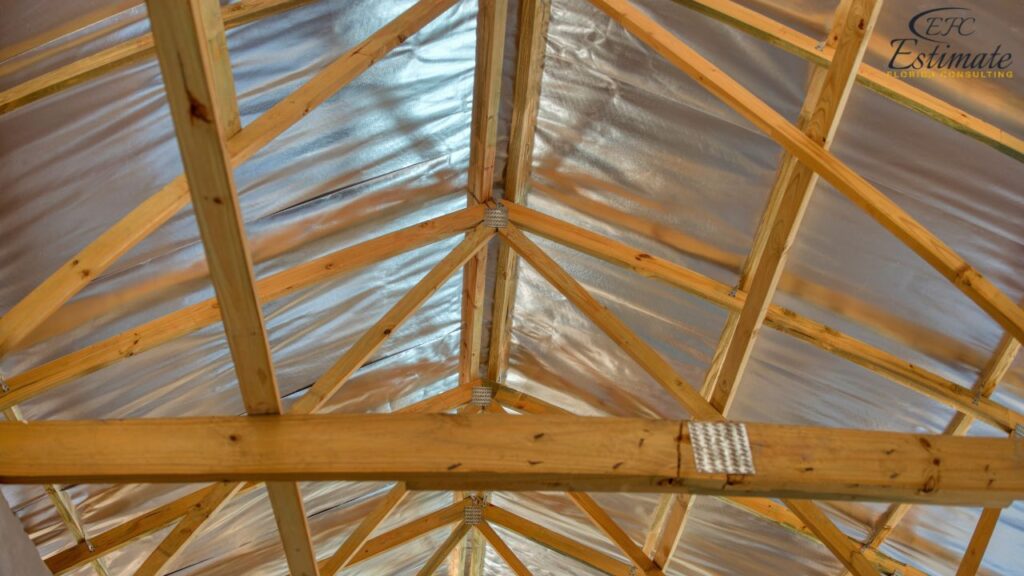
Reflective Insulation Cost Calculator
To assist you in planning and budgeting your reflective insulation project, Estimate Florida Consulting provides estimate services that include a comprehensive reflective insulation cost calculator. This tool allows you to input specific details about your project, such as the type of reflective insulation, the total area to be covered, and the installation method. The calculator then provides an estimated cost range, giving you a clear understanding of what to expect. This tool is essential for aligning your project plans with your budget, ensuring that you have the financial resources necessary to complete the project without compromising on quality. By using the cost calculator, you can avoid potential cost overruns and ensure that your insulation project is both financially and structurally sound.
Reflective Insulation Costs by Area Size and Project Scope
The size of the area to be insulated plays a significant role in determining the overall cost of the project. Larger areas naturally require more materials and labor, which can drive up costs. Estimate Florida Consulting provides estimate services that offer detailed cost breakdowns based on the size of the area to be insulated, allowing you to plan your project budget with greater accuracy. Here’s a breakdown of estimated reflective insulation costs by area size:
Area Size (Square Feet) | Estimated Reflective Insulation Cost per Square Foot | Total Reflective Insulation Cost Range |
1,000 sq ft | $1.44 – $2.88 | $1,440 – $2,880 |
2,000 sq ft | $1.56 – $3.12 | $3,120 – $6,240 |
5,000 sq ft | $1.73 – $3.46 | $8,640 – $17,300 |
10,000 sq ft | $1.92 – $3.60 | $19,200 – $36,000 |
Check Out Videos
Electrical Installation
Lift Station Control Panel
Light Fixer Install
Detailed Cost Breakdown for Reflective Insulation Projects
To provide a comprehensive view of the potential costs involved in your reflective insulation project, here’s a detailed cost breakdown based on different components of the process:
Reflective Insulation Component | Estimated Cost per Square Foot | Total Cost Range |
Material Costs (Radiant Barrier, Bubble, Foam) | $0.86 – $1.73 | $860 – $1,730 (for 1,000 sq ft) |
Installation Labor | $0.43 – $0.86 | $430 – $860 (for 1,000 sq ft) |
Surface Preparation | $0.14 – $0.29 | $140 – $290 (for 1,000 sq ft) |
Additional Insulation Layers | $0.35 – $0.70 | $350 – $700 (for 1,000 sq ft) |
Permits and Inspections | $350 – $1,730 | $350 – $1,730 (one-time fee) |
Material Costs (Radiant Barrier, Bubble, Foam)
The cost of materials is a significant factor in any reflective insulation project. Reflective insulation materials, such as radiant barriers, bubble insulation, and foam, typically range from $0.86 to $1.73 per square foot. For a standard 1,000 square foot area, this equates to a total cost between $860 and $1,730. Radiant barriers are commonly used in attics to reflect heat away from living spaces, while bubble insulation and foam offer additional thermal resistance and are often used in walls, roofs, and floors. The choice of material will depend on the specific requirements of the project, such as the desired R-value and the area being insulated.
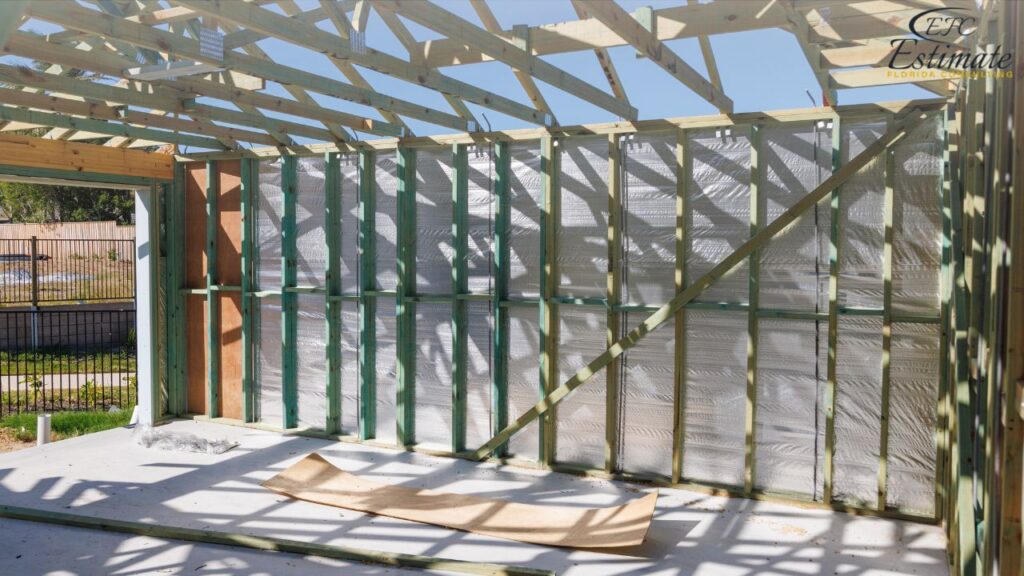
Installation Labor
Labor costs are another crucial component of the overall project budget. The installation of reflective insulation generally costs between $0.43 and $0.86 per square foot, totaling $430 to $860 for a 1,000 square foot area. These costs can vary based on the complexity of the installation and the skill level of the labor force. For instance, installing insulation in tight or awkward spaces can increase labor time and, consequently, costs. Skilled installers may charge higher rates, but their expertise ensures a more efficient and higher-quality installation, reducing the likelihood of errors that could lead to higher costs later.
Surface Preparation
Before installing reflective insulation, proper surface preparation is essential to ensure that the materials adhere correctly and perform effectively. This step involves cleaning, leveling, and possibly repairing the surface to create a suitable base for the insulation. The cost of surface preparation ranges from $0.14 to $0.29 per square foot, resulting in a total cost between $140 and $290 for a 1,000 square foot area. Proper surface preparation is a crucial investment in the longevity and effectiveness of the insulation, as inadequate preparation can lead to poor insulation performance and the need for costly repairs.
Additional Insulation Layers
In some cases, additional layers of insulation may be required to achieve the desired thermal resistance or to meet specific building codes. The cost for these additional layers typically ranges from $0.35 to $0.70 per square foot, leading to a total additional cost of $350 to $700 for a 1,000 square foot area. Adding more layers can improve energy efficiency and provide greater comfort, especially in regions with extreme temperatures. However, this will also increase both material and labor costs, so it’s important to balance the benefits with the budget.
Permits and Inspections
Finally, securing the necessary permits and undergoing inspections is a vital part of any insulation project. These costs typically range from $350 to $1,730 as a one-time fee. Obtaining permits ensures that the work complies with local building codes, while inspections verify that the installation meets all safety and quality standards. Failing to acquire the proper permits and pass inspections can result in fines, delays, or even the need to redo parts of the project, so it’s essential to include these costs in your budget from the outset.
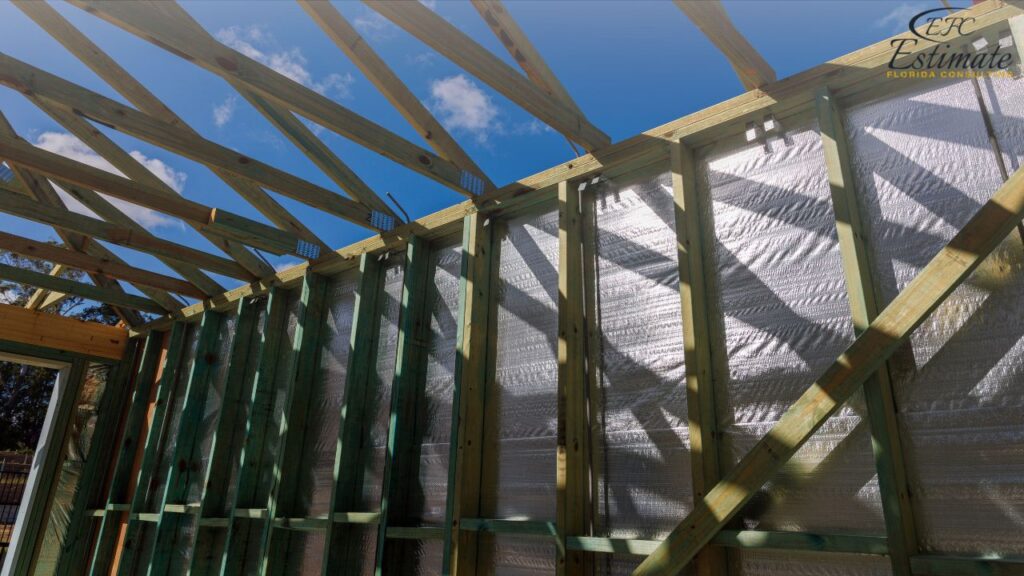
Types of Reflective Insulation
Reflective insulation comes in various forms, each suited to different applications and offering distinct benefits that can impact the overall performance of your building. Estimate Florida Consulting provides estimate services that take into account the specific type of reflective insulation you choose, helping you select the best option for your project based on your unique needs and goals. Common types of reflective insulation include:
Radiant Barrier Foil
This type of reflective insulation is typically installed in attics to reflect radiant heat away from the living space, helping to keep the interior cooler during hot weather. Radiant barrier foil is highly effective in reducing cooling costs in hot climates, making it a popular choice for homeowners and businesses looking to improve energy efficiency.
Reflective Bubble Insulation
Composed of one or two layers of bubble wrap sandwiched between layers of reflective foil, this type of insulation is ideal for insulating ducts, pipes, and walls. Reflective bubble insulation provides both thermal insulation and moisture resistance, making it a versatile option for a wide range of applications. It is particularly useful in areas where moisture control is a concern, as it helps to prevent condensation and related issues.
Reflective Foam Insulation
This insulation combines reflective foil with foam, offering added insulation value and structural strength. Reflective foam insulation is often used in walls, roofs, and floors to provide a barrier against both radiant and conductive heat.
Its dual-functionality makes it an excellent choice for projects that require both thermal insulation and additional structural support, offering long-term benefits in terms of durability and energy savings.
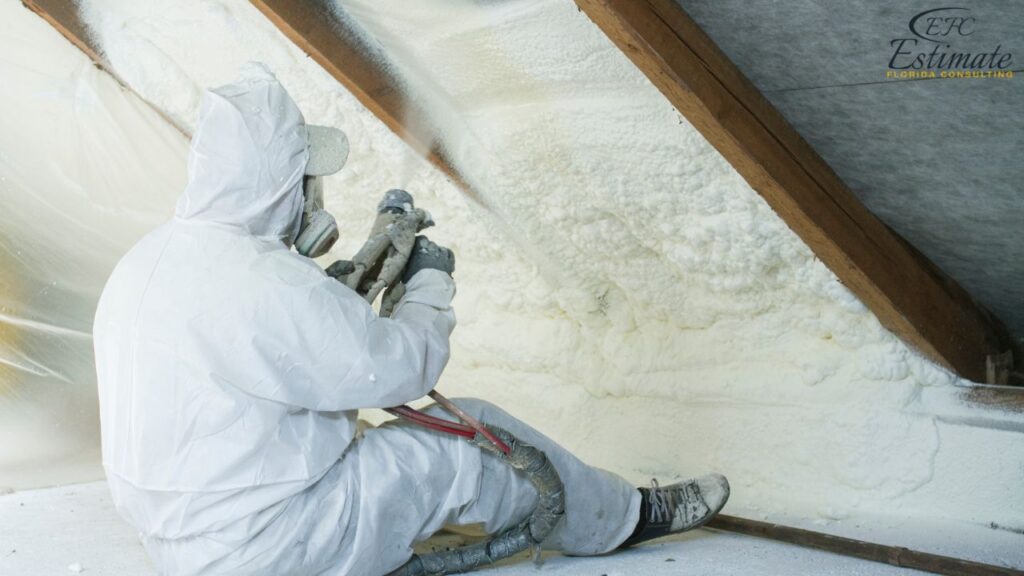
Factors Influencing Reflective Insulation Costs
Several critical factors can significantly influence the overall cost of a reflective insulation project. Understanding these factors is key to effective planning and budgeting:
Type of Reflective Insulation
The choice of material, such as radiant barrier foil, bubble insulation, or reflective foam, directly impacts the overall cost of the project. Higher-performance materials may have a higher upfront cost, but they offer greater energy savings, durability, and overall effectiveness, making them a worthwhile investment in the long term. Selecting the right type of insulation is crucial for balancing cost with performance.
Installation Complexity
The complexity of the installation process, including the need to work around obstacles, cover irregularly shaped areas, or integrate the insulation with other building systems, can increase labor costs. Projects that require specialized installation techniques or additional steps for securing the reflective material may also incur higher costs. Proper planning and skilled labor are essential for ensuring the installation is done correctly and efficiently, minimizing potential issues.
Area Size and Coverage
The total area to be insulated is a major factor in determining costs. Larger areas require more material and labor, leading to higher overall costs. Accurate measurement and calculation are essential to avoid overestimating or underestimating the required materials, which can lead to unnecessary expenses or shortages. Properly estimating the area to be covered ensures that the project stays within budget and that all areas are adequately insulated.
Environmental Considerations
Local environmental factors, such as climate, humidity, and exposure to the elements, can influence the choice of reflective insulation and its installation method. In areas with extreme temperatures or high humidity, high-performance reflective insulation may be necessary to achieve the desired energy efficiency, leading to increased costs. Understanding the specific environmental challenges of your location is crucial for selecting the right insulation and installation method to ensure long-term performance and durability.
Reflective Insulation Cost Estimator Services
To get started with our reflective insulation cost estimator services, simply contact Estimate Florida Consulting with your project details. Our team will work closely with you to gather all necessary information, including blueprints, material preferences, and any existing conditions that may affect the insulation process. We will then provide a detailed and accurate cost estimate that covers all aspects of the reflective insulation process, from material costs to labor and permits. This estimate serves as a valuable tool for planning and budgeting, ensuring that you have a clear understanding of the financial requirements for your project and can manage your resources effectively. Estimate Florida Consulting provides estimate services that empower you with the knowledge and tools needed to ensure your project is financially sound and successfully executed.
The Benefits of Choosing Reflective Insulation for Your Project
Reflective insulation offers several significant advantages for improving the energy efficiency, comfort, and overall performance of your building. By choosing reflective insulation, you can benefit from:
Enhanced Energy Efficiency
Reflective insulation is highly effective at reducing heat gain, particularly in hot climates where radiant heat is a major concern. By reflecting heat away from the building, this insulation type helps maintain cooler indoor temperatures, reducing the need for air conditioning and leading to lower energy bills. The long-term energy savings provided by reflective insulation can significantly offset the initial installation costs, making it a cost-effective solution for improving building performance.
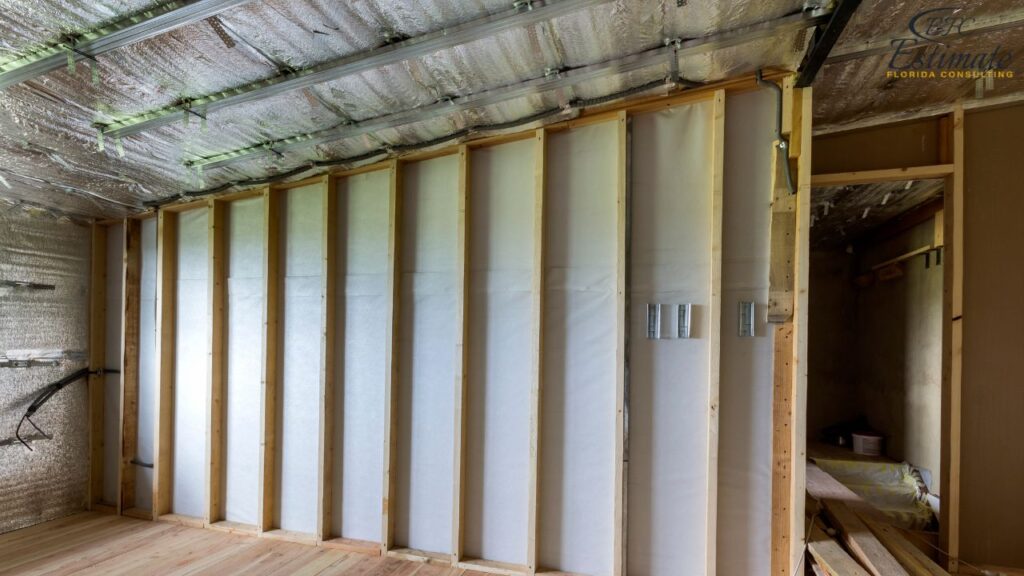
Improved Indoor Comfort
By minimizing the amount of heat that enters the building, reflective insulation helps to maintain more consistent and comfortable indoor temperatures, even during the hottest months of the year. This can lead to a more pleasant living or working environment, with fewer temperature fluctuations and reduced reliance on HVAC systems. The improved indoor comfort provided by reflective insulation can also enhance the overall quality of life for occupants, making it a worthwhile investment for both residential and commercial properties.
Durability and Longevity
Reflective insulation materials, such as aluminum foil and reflective foam, are highly durable and resistant to degradation over time. This means that once installed, reflective insulation can continue to perform effectively for many years with minimal maintenance, providing long-term benefits in terms of energy savings and indoor comfort. The durability and longevity of reflective insulation make it a smart choice for projects that require reliable and long-lasting solutions for managing heat gain and improving energy efficiency.
Environmental Impact
By reducing the amount of energy needed to cool a building, reflective insulation helps to lower your overall carbon footprint, contributing to more sustainable building practices. The use of reflective insulation supports efforts to reduce energy consumption and greenhouse gas emissions, aligning with global goals for environmental sustainability. Choosing reflective insulation is not only beneficial for your building’s performance but also for the planet, making it an environmentally responsible choice for modern construction projects.
Download Template For Reflective Insulation Project Breakdown
- Materials list updated to the zip code
- Fast delivery
- Data base of general contractors and sub-contractors
- Local estimators

Why Choose Estimate Florida Consulting for Your Reflective Insulation Takeoffs?
Choosing Estimate Florida Consulting for your reflective insulation takeoffs ensures that you receive accurate, detailed estimates tailored to your project’s specific needs. Our team’s extensive experience in the construction industry, combined with our commitment to quality and customer satisfaction, makes us the ideal partner for your project. We take pride in our attention to detail and our ability to deliver precise estimates that help you manage costs, minimize waste, and achieve successful project outcomes. By partnering with us, you can be confident that your reflective insulation project is in capable hands, ensuring a durable and cost-effective solution. Estimate Florida Consulting provides estimate services that go beyond just numbers—we provide the expertise, support, and guidance you need to bring your project to successful completion.
Conclusion
Accurate cost estimation is the foundation of a successful reflective insulation project. Estimate Florida Consulting provides comprehensive and precise estimate services that help you plan and execute your project with confidence. Our detailed estimates ensure that every aspect of your reflective insulation process is properly accounted for, leading to a successful and cost-effective project. Contact us today to get started with your reflective insulation takeoff estimate and take the first step toward a more energy-efficient and comfortable building. With our expert guidance, you can move forward with confidence, knowing that your project is well-planned, financially secure, and executed to the highest standards.
FAQs
Reflective insulation is an advanced solution designed to enhance energy efficiency by reducing heat transfer in buildings. It is particularly effective in hot climates where controlling radiant heat gain is essential. This type of insulation is commonly used in attics, roofs, walls, and other areas where heat control is crucial. Reflective insulation works by reflecting radiant heat away from living spaces, helping to maintain a cooler indoor environment.
Reflective insulation works by using a reflective surface, usually made of aluminum foil, to reflect radiant heat away from the interior of a building. Unlike traditional insulation, which slows the transfer of heat, reflective insulation reduces heat gain by reflecting it, making it particularly effective in hot climates. This type of insulation is often used in conjunction with other insulation materials to provide comprehensive thermal protection.
The cost of reflective insulation varies depending on the type of material used, the size of the area to be insulated, and the complexity of the installation. On average, reflective insulation costs range from $1.44 to $3.60 per square foot. The total cost can increase based on factors like the specific insulation material chosen, such as radiant barriers, bubble insulation, or reflective foam, and any additional layers required to meet building codes or achieve desired thermal resistance.
To assist you in planning and budgeting your reflective insulation project, Estimate Florida Consulting provides a comprehensive reflective insulation cost calculator. This tool allows you to input specific details about your project, such as the type of reflective insulation, the total area to be covered, and the installation method. The calculator then provides an estimated cost range, giving you a clear understanding of what to expect. This tool is essential for aligning your project plans with your budget and ensuring that you have the necessary financial resources to complete the project without compromising on quality.
The size of the area to be insulated plays a significant role in determining the overall cost of the project. Larger areas naturally require more materials and labor, which can drive up costs. Here’s a breakdown of estimated reflective insulation costs by area size:
- 1,000 sq ft: $1,440 – $2,880
- 2,000 sq ft: $3,120 – $6,240
- 5,000 sq ft: $8,640 – $17,300
- 10,000 sq ft: $19,200 – $36,000
To provide a comprehensive view of the potential costs involved in your reflective insulation project, here’s a detailed cost breakdown based on different components of the process:
- Material Costs (Radiant Barrier, Bubble, Foam): $0.86 – $1.73 per square foot, totaling $860 – $1,730 for 1,000 sq ft.
- Installation Labor: $0.43 – $0.86 per square foot, totaling $430 – $860 for 1,000 sq ft.
- Surface Preparation: $0.14 – $0.29 per square foot, totaling $140 – $290 for 1,000 sq ft.
- Additional Insulation Layers: $0.35 – $0.70 per square foot, totaling $350 – $700 for 1,000 sq ft.
- Permits and Inspections: $350 – $1,730 as a one-time fee.
Reflective insulation comes in various forms, each suited to different applications and offering distinct benefits:
- Radiant Barrier Foil: Ideal for attics, this insulation reflects radiant heat away from living spaces, reducing cooling costs in hot climates.
- Reflective Bubble Insulation: Composed of bubble wrap between layers of reflective foil, it’s used for ducts, pipes, and walls, providing thermal insulation and moisture resistance.
- Reflective Foam Insulation: Combines reflective foil with foam for added insulation value and structural strength, used in walls, roofs, and floors.
Several factors can significantly influence the overall cost of a reflective insulation project:
- Type of Reflective Insulation: The choice of material, such as radiant barrier foil, bubble insulation, or reflective foam, directly impacts costs.
- Installation Complexity: The complexity of the installation process, such as working around obstacles or covering irregularly shaped areas, can increase labor costs.
- Area Size and Coverage: Larger areas require more material and labor, leading to higher overall costs.
- Environmental Considerations: Local climate, humidity, and exposure to elements can influence insulation choice and installation method, affecting costs.
Google Reviews



Process To Get Reflective Insulation Cost Estimate Report
Here I am going to share some steps to get reflective insulation cost estimate report.
-
You need to send your plan to us.
You can send us your plan on info@estimatorflorida.com
-
You receive a quote for your project.
Before starting your project, we send you a quote for your service. That quote will have detailed information about your project. Here you will get information about the size, difficulty, complexity and bid date when determining pricing.
-
Get Estimate Report
Our team will takeoff and estimate your project. When we deliver you’ll receive a PDF and an Excel file of your estimate. We can also offer construction lead generation services for the jobs you’d like to pursue further.

